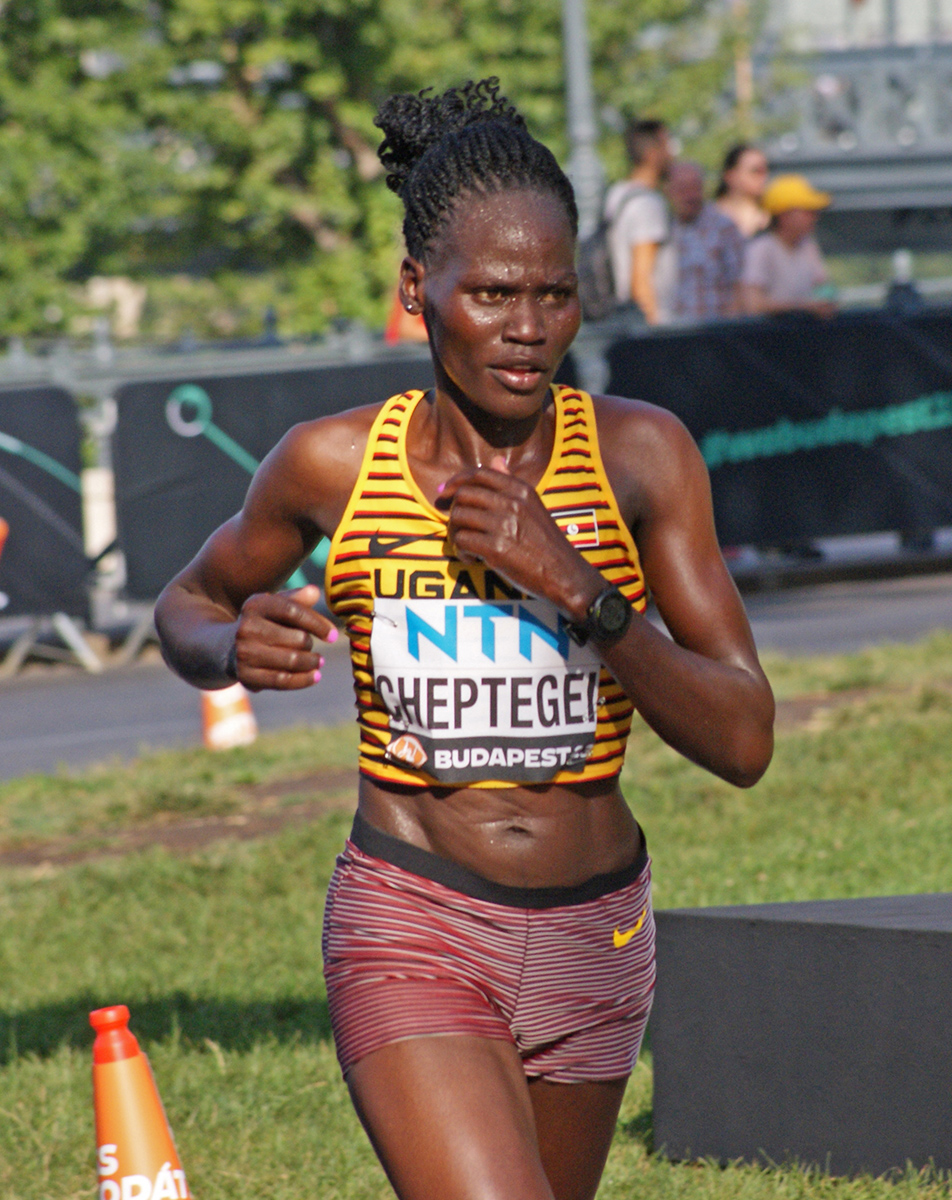Photo credit: Rebecca Cheptegei. (2024, October 21). In Wikipedia. https://en.wikipedia.org/wiki/Rebecca_Cheptegei
Femicide—the killing of women or girls due to their gender—has become a term more widely recognized in recent conversations, especially after the tragic deaths of African athletes in recent years. These high-profile cases have spotlighted a persistent problem that goes far beyond the sports world.
Rebecca Cheptegei, a Kenya-based Ugandan marathon runner who recently competed in the 2024 Paris Olympics lost her life after being set on fire by her former partner in Kenya. Cheptegei was the third female athlete to be killed in Kenya since 2021 in incidents linked to gender violence, according to TRT Afrika.
Another elite Kenyan athlete who the world lost at the hands of femicide was Agnes Tirop, who won bronze medals in the 10,000 metres at the 2017 and 2019 World Athletics Championships, and became the second-youngest ever gold medallist at the 2015 IAAF World Cross Country Championships. In 2021, Tirop was stabbed by her husband, who was arrested but is still awaiting trial.
Then there’s the 2022 death of Damaris Mutua, a Kenyan-Bahraini athlete who was strangled by her estranged partner just weeks after she had placed third in a half marathon. These cases exemplify the violence faced by female athletes who, despite their international fame, remain vulnerable to domestic abuse and gender-based violence.
Why Are Elite Female African Athletes Being Killed?
TRT Afrika explains that female athletes in Kenya face unique challenges that come with fame and fortune. While their success allows them to break free from traditional gender roles, it often exposes them to financial exploitation and abuse by intimate partners. Many athletes from rural areas encounter men who offer to assist with training, only to become controlling partners or husbands over time. These men gradually isolate the women from their social circles, taking control of their finances.
Athletes who try to reclaim their autonomy often face escalating physical abuse. Despite efforts by Athletics Kenya to address these issues by promoting education on domestic abuse and financial literacy in rural areas, the cycle of violence persists. The organization faces challenges in providing long-term solutions, as many women in abusive relationships reconcile with their partners after seeking temporary shelter, making intervention difficult.
A Global and Ancient Issue
Though some of the most well-known cases come from the world of sports and high-profile relationships, femicide is not limited to public figures. It has deep historical roots, stretching back through centuries of human history, with misogyny, entitlement over women’s bodies, and economic control forming the core causes. As Dr. Natalia Kanem of the UN Population Fund explained, femicide remains “one of the most prevalent human rights violations,” perpetuated by harmful cultural norms and societal acceptance of control over women’s lives.
Is Femicide on the Rise?
Earlier this year, femicide protests were held in several large towns in Kenya after over a dozen women had been killed within weeks of each other, TRT Afrika reported.
But worldwide, while media reports suggest an increase in femicide, experts caution that it may be partly due to increased visibility in the 24/7 news cycle and social media.
Regardless, the stastics are shocking. According to a report by UN Women, in 2023, a woman is killed by someone in her own family every 11 minutes, though real incidence rates are likely to be far higher. Globally, despite a drop in the overall number of homicides, incidents of femicide are the highest on record, with 89,000 women and girls intentionally killed in 2022.
However, statistics are often underreported, particularly in regions where domestic violence is still normalized. Although the pandemic has intensified gender-based violence globally, making it feel like femicide is on the rise, the heightened media coverage has contributed to more awareness and reporting, which is a step toward change.
Increasing Awareness and Fighting Back
Increased visibility has brought public attention to femicide, igniting protests and demanding action. For example, grassroots movements in Kenya and other countries have called for better support for victims and stricter legal action against perpetrators. Activists stress the importance of awareness campaigns and educational efforts that empower women financially and legally, helping to dismantle the systems that perpetuate abuse.
Fighting For A Femicide-Free World
Even one case of femicide is one too many. A world without such violence may seem like an impossible ideal, but it is a goal worth striving for. Raising awareness, supporting survivors, and addressing the root causes of femicide will be essential in turning the tide against this ancient injustice. Only through persistent effort can we hope to build a future where every life, regardless of gender, is valued equally.




